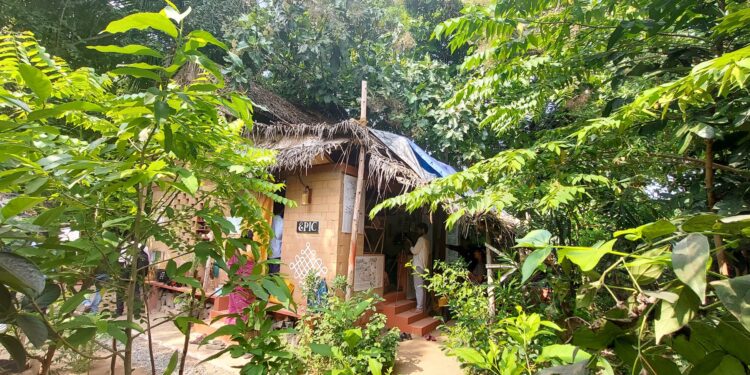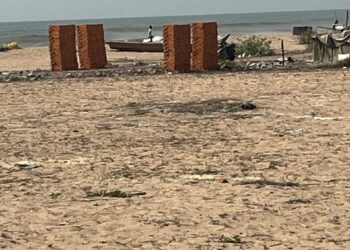‘An oasis in the desert’ is how one can aptly describe the Eco-Park and Information Centre (EPIC), promoted by Sheela Shanta Nair, IAS (Retd.), former Secretary to the Government of India.
EPIC stands as an icon of how rainwater harvesting alone can help sustain a park of 20 cents, replete with a herbal garden, Miyawaki forest, Nakshatra garden, crops, azolla and mushroom cultivation, and much more.
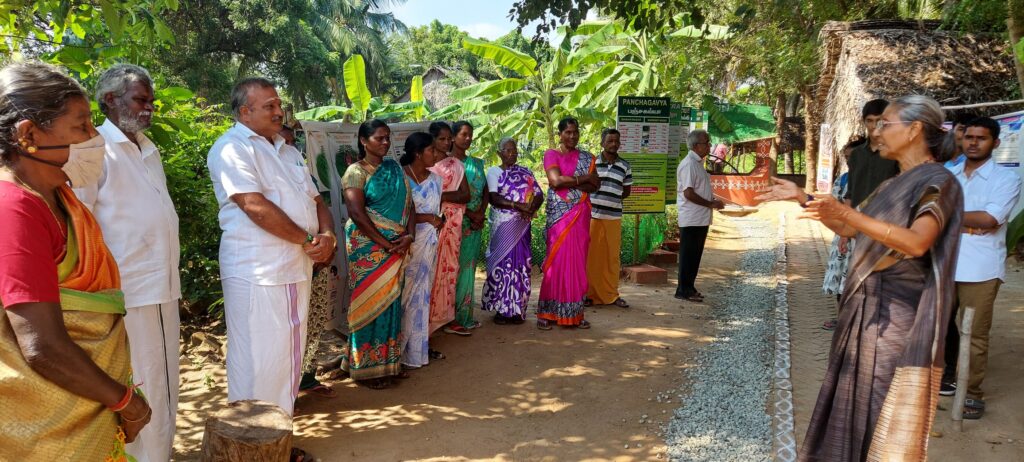
“I purchased this piece of land long back, but was unsure what to do with it. While many would have opted for luxury villas, bringing Singapore to India, I wanted to bring a fertile rural India to this place,” explained Sheela, and added, “Unfortunately when I embarked on the idea, I found out that my land sits on a massive rock, so, despite having a lake behind and the sea in front, there was not a drop of groundwater beneath.”
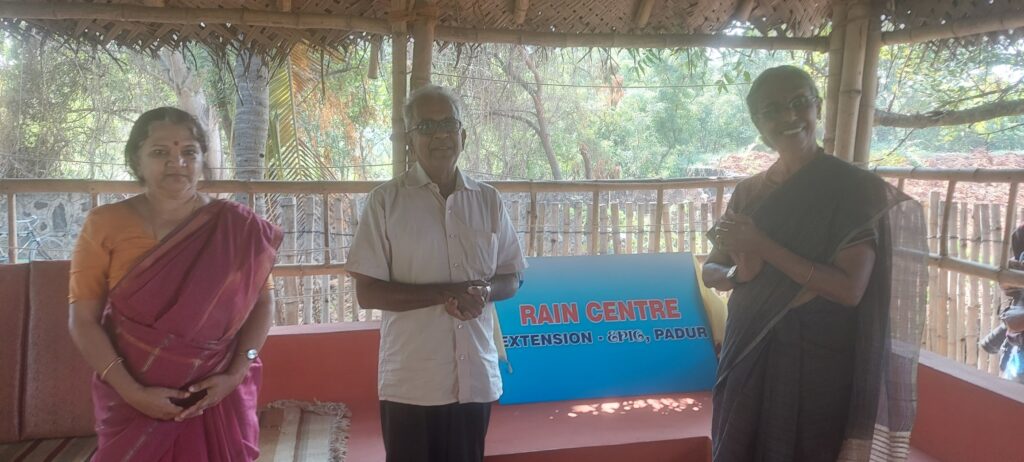
Sheela contacted Dr.Sekhar Raghavan, Director of Rain Centre, Gandhi Nagar, Adyar, who provided some pathbreaking solutions to the issue. The solutions helped build the water table, fill up a well, create a water bed for azolla cultivation and an artificial pond – all from the harvested rainwater. These features have made the park a model and helped Rain Centre establish its extension at EPIC, with the aim of imparting knowledge on water conservation and harvesting methodologies in rural areas.
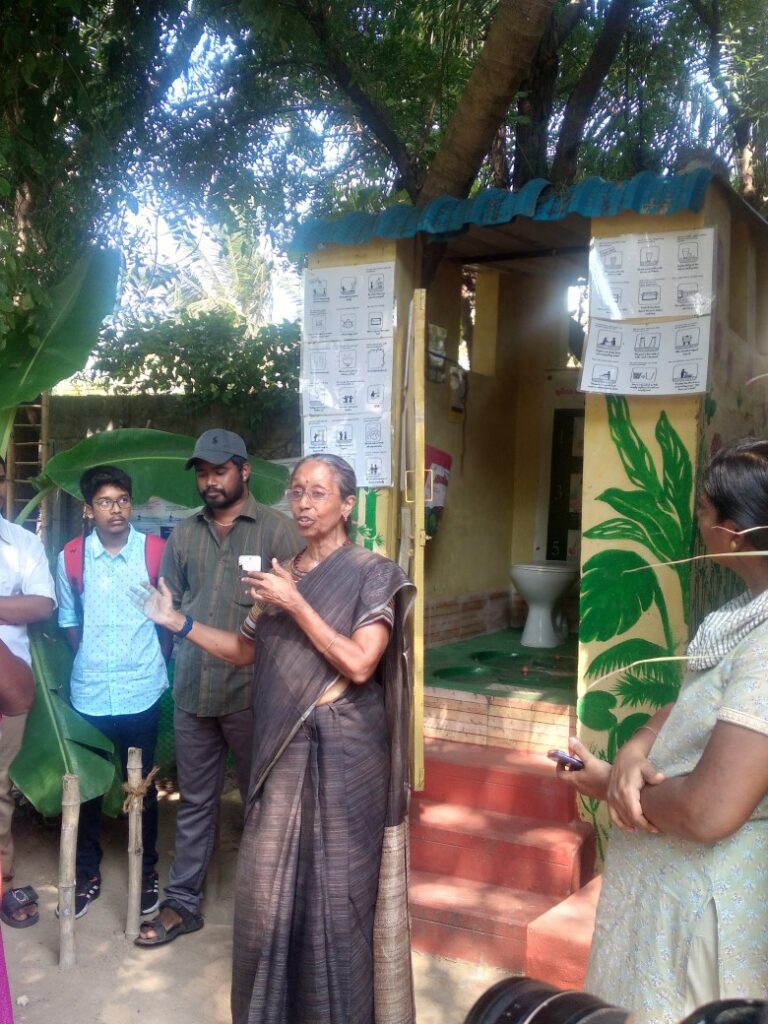
Each and every feature at the eco park reflects a deep-seeded respect for nature and sustainable living, which is Sheela’s hallmark principle! Buildings are made of hollow laterite blocks that are interlocked with each other and not cemented together; A two-tiered thatched room provides a lot of cool breeze with cross ventilation; a ‘no-water toilet’ (another of Sheela’s pilot projects) waters and manures the nearby garden with human excreta; a biogas plant is fed with waste from the kitchen and the garden, to light up the stove.
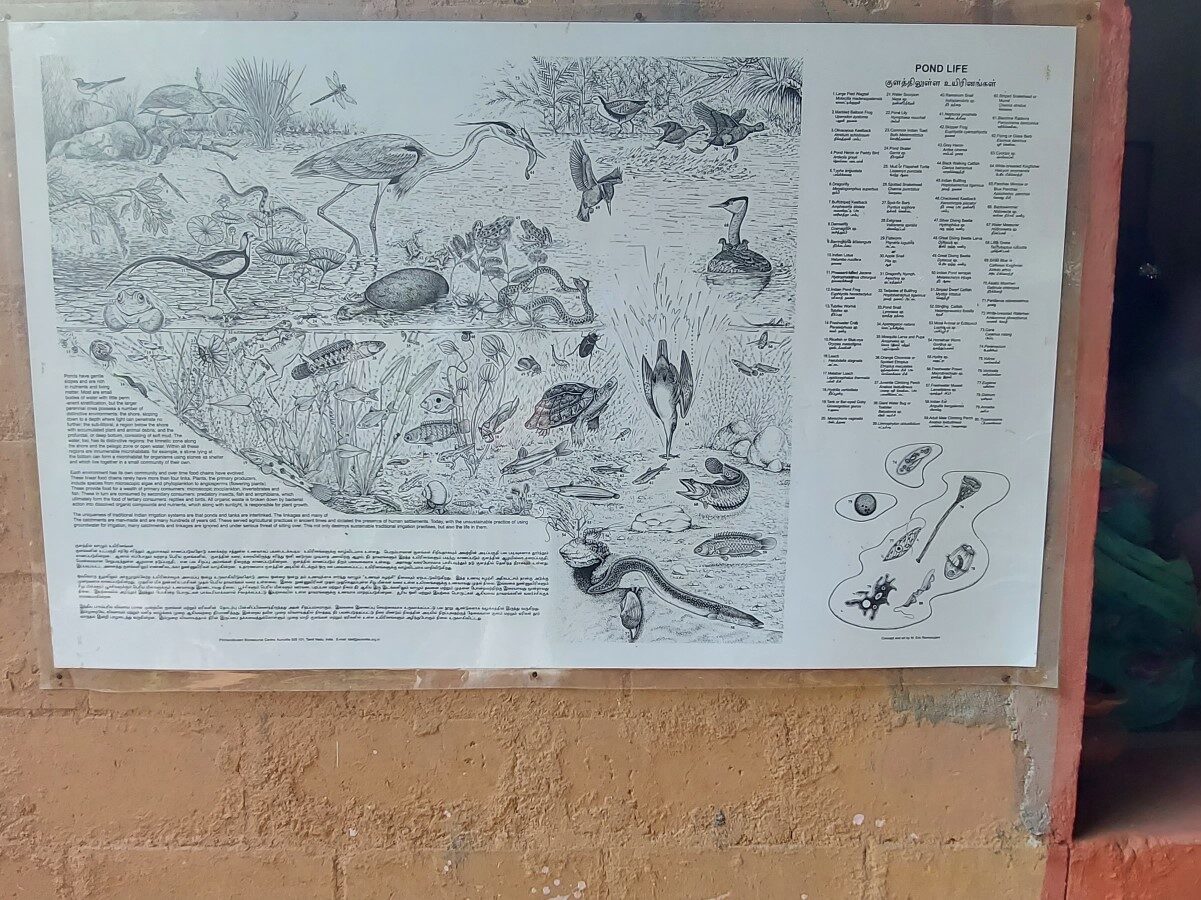
There are also many illustration boards on the flora and fauna of various habitats, including the one at the eco park. “After we started up in the Miyawaki forest, the eco-park began to thrive, and there has been an increase in the number of birds visiting the place. So much so that we once organised a bird watch with Prof.Susy Varughese (IIT Madras), her students and students and parents of Pathashaala (PCFL-KFI) School. We identified at least 40 species of birds within an hour, here. The flowers and fruits from our small forest had attracted the birds,” explained Sheela enthusiastically, while also informing that the growing of millets at the farms had also attracted peacocks. Though they are known to ravage plants, strict instructions were given not to do anything to the birds due to their national status.
The centre is visited by many students, farmers and sustainability enthusiasts who take with them more than just a leaf of knowledge on sustainability practices. Impressed students of Sathyabama University, apart from making a video about EPIC, also contributed to the farm by designing beautiful patterns on the walls of EPIC. “As farmers we had been focused on cultivating only staples, but we never thought that so much more could be done. This visit is an eye opener,” said an awed R.Lakshmi, who came to the farm from Vallipuram, Chengalpattu district. When the Adyar Times team visited the farm, Lakshmi and her fellow farmers had come to the centre with the students of the Pathashaala (PCFL-KFI), Elumichampattu.
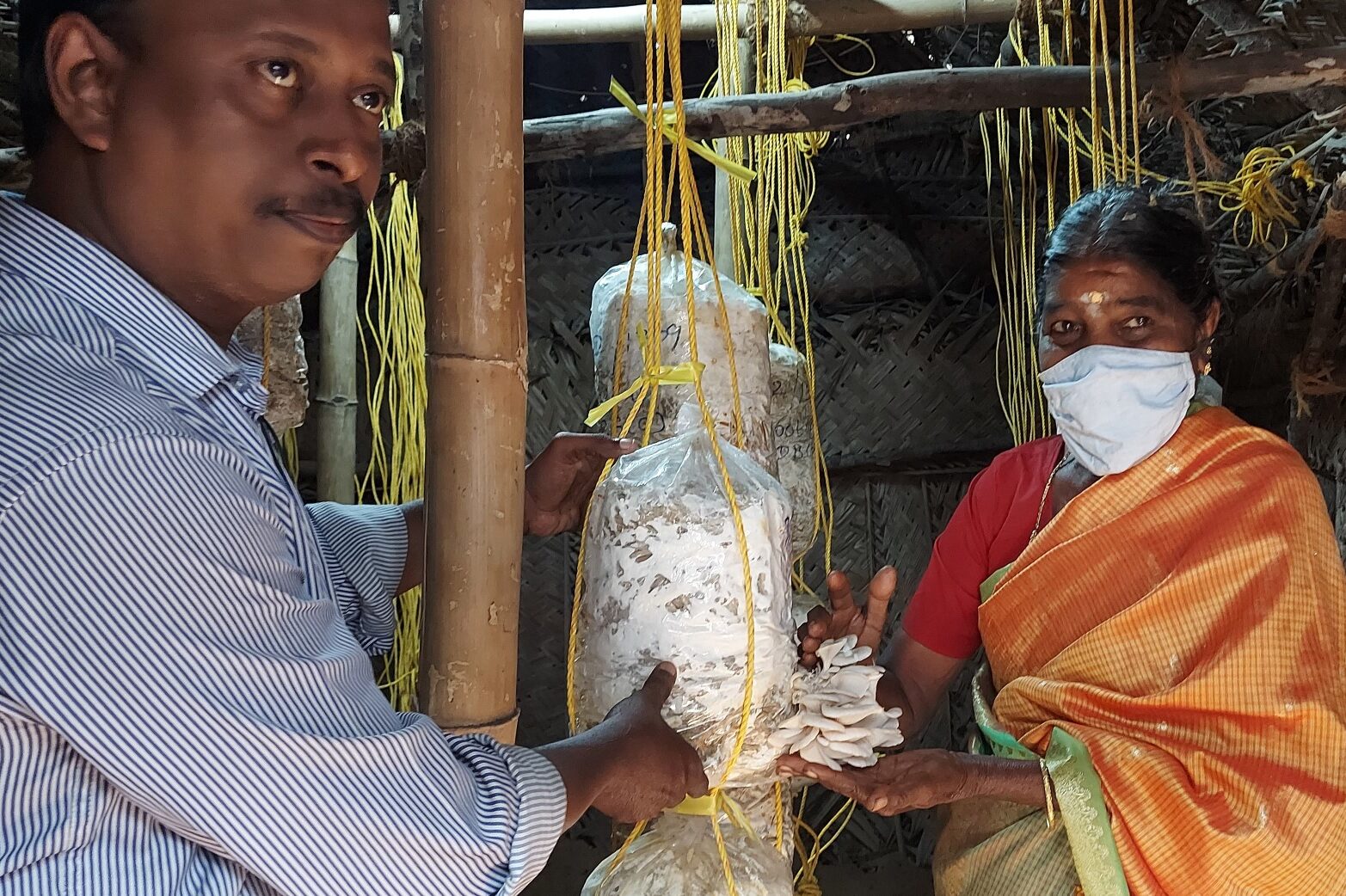
There was Rajamma, who excitedly pointed out various plants and spoke of their medicinal properties. “We at Pathashaala school go to Rajamma for all ailments. She is an expert on herbs,” Sumitra M.Gautama, Principal of the school introduced her. Rajamma was given the honour of harvesting the first batch of the Oyster mushroom at the eco park. The mushroom cultivation zone was set up with the help of iYarKai Tech Lab. B.Senthil Kumar, Managing Director of the lab, explained about mushroom cultivation and how small spaces in farms could be utilised for it.
The eco park also hosts sessions with experts from Institute of Sustainable Development (ISD), India NGO, Rain Centre, iYarKai Tech Lab and many individuals like Alladi Mahadevan, who share their knowledge to enlighten the visitors on various methodologies to make agriculture more productive and lucrative.
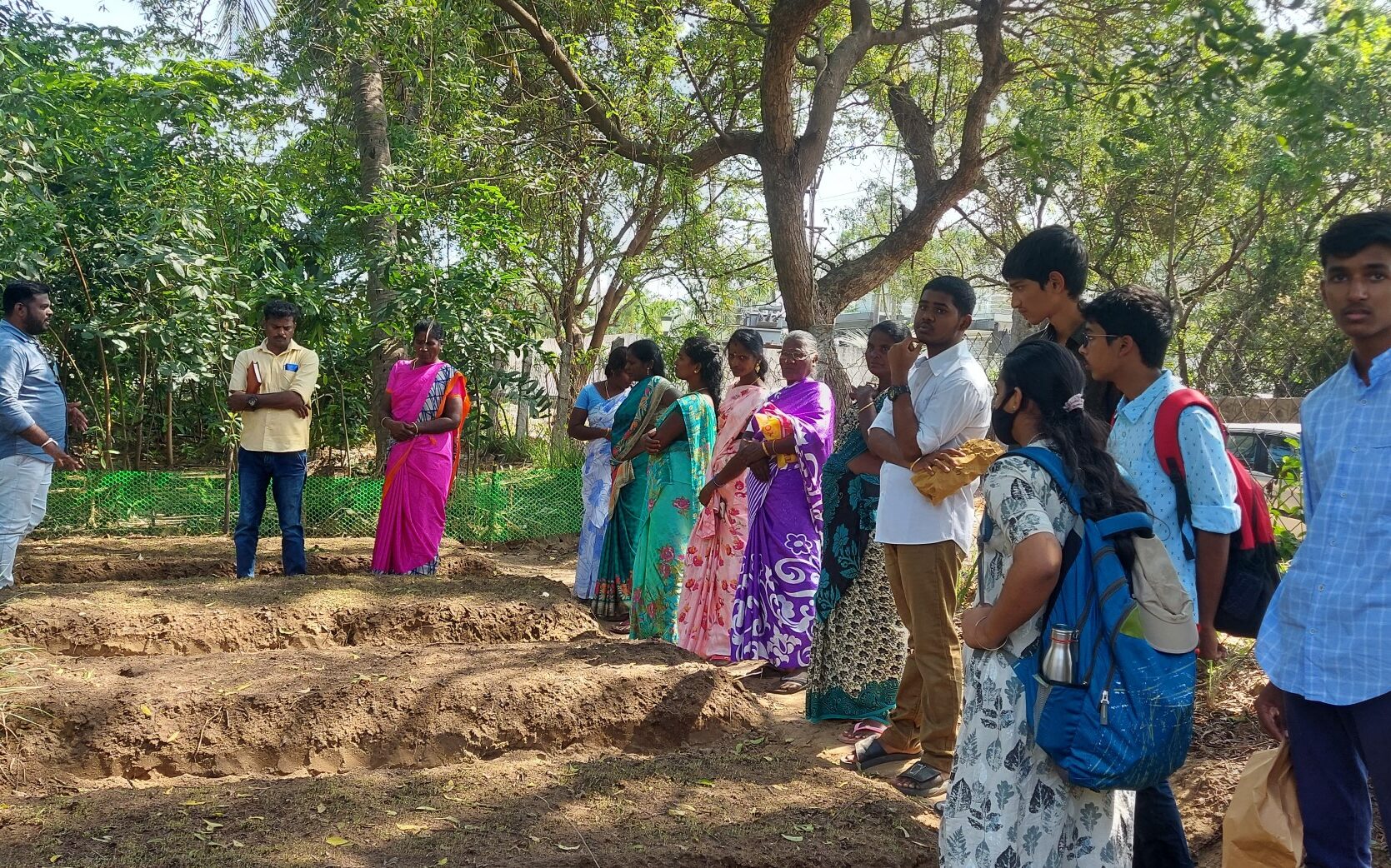
S.Kalaiyarasan, Community Organiser with ISD and J.Kirubakaran, Coordinator – Field Research and Training with ISD, gave us a tour of the farm and explained the farming techniques implemented there. The farm had a variety of greens and vegetables, millets and rare varieties of rice. Later, he questioned the visiting farmers if agriculture was a profitable venture. The question drew agony from all the farmers who pointed out the lack of respect and income from the profession, but agreed that, “Someone needs to grow food grains and we have taken that upon us.” They also mentioned the sad state of affairs in agriculture, caused mainly by large companies taking over farmland. It has deterred their children from taking over farming as a profession. Who would grow food then?
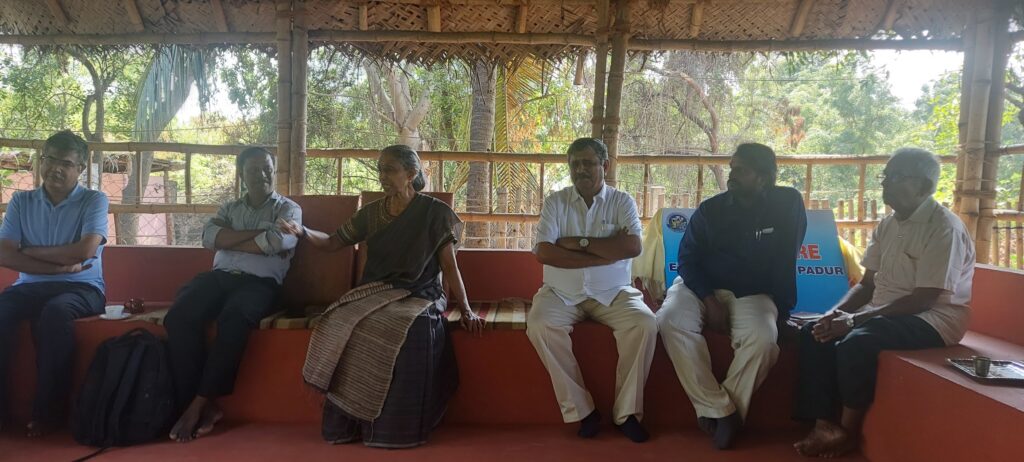
The ISD team shared facts and tips on how to make agriculture profitable, the importance of growing millets, difference between natural manure and chemical fertilisers and many more insights. Shanta also shared her journey as an evolving farmer crossing hurdles like flooding, drought etc. Organic farmer, Alladi Mahadevan, shared a great gyan, “You must first grow for yourself, then for your family, extend to your neighbours, friends and relatives, and then to your village, town and beyond.” This, he said, was the true spirit of farming and the route to sustainable farming. He also encouraged farmers to prepare products like pickles and vadams from their produce. This, apart from supplementing their income, would also make use of excess produce.
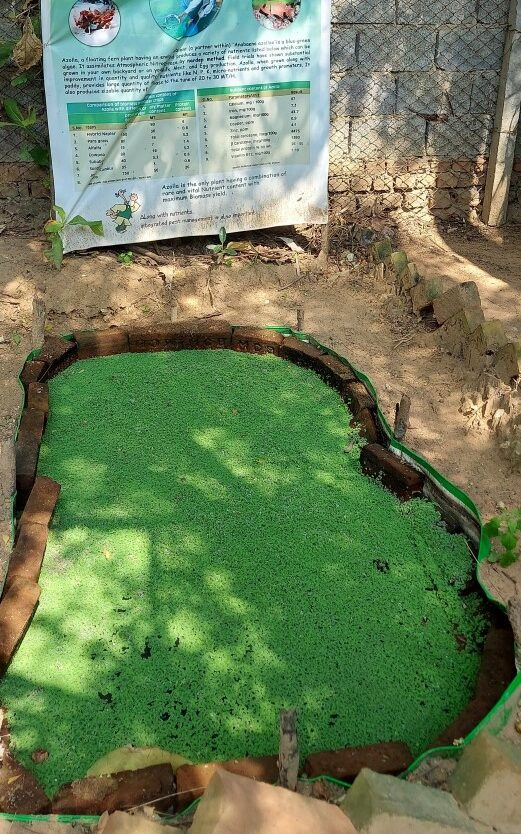
Inspired by the eco park, the students of Pathashaala researched and provided more inputs to the farmers. Lakshmi and her fellow farmers were left with awe at the opportunities available to them. “Today my eyes have been opened to what all can be done by us, small farmers, in a small piece of land. We never knew about the benefits of azolla cultivation in a farm and the ease of mushroom cultivation. We also take back lots of ideas on supplementing our income. We would surely discuss with our village folks about implementing these techniques,” said Laksmi in her parting comments.
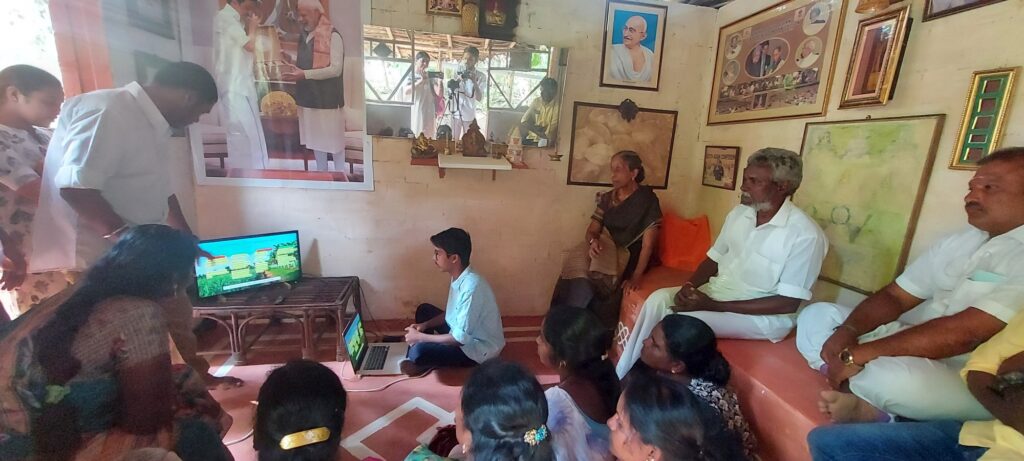
Naveen Sriram, Mahin and Nandan, students of Pathashaala school said that the visit gave them a lot of insight into sustainable farming, techniques, methodologies and solutions to issues faced by the farmers. “At Pathashaala, our children do their own chores. From keeping the school clean to growing our own vegetables, the children are involved in everything. A visit to this eco park is a learning experience for them, which they will implement at our school,” said Sumitra.
As we bid goodbye to the ecopark, a passionate Sheela stated, “This permaculture eco park is the germ of an idea from my heart and out of my own pocket. I wish to showcase low cost and alternate technologies in lifestyles.”
Sheela is also open to having yoga / meditation classes at her centre. Farmers, interested students and sustainable living enthusiasts / influencers with serious thoughts in farming can contact her at 99520 09111. For more information on EPIC, visit https://epkc.in; B.Senthil Kumar of Iyarkai Tech Lab Pvt Ltd at 99400 28160; Institute of Sustainable Development at 94443 86295; Rain Centre at 96770 43869; Follow Alladi Mahadevan’s farmposts on Instagram @alladimahadevan.


